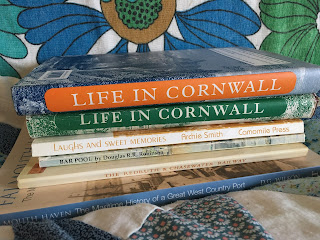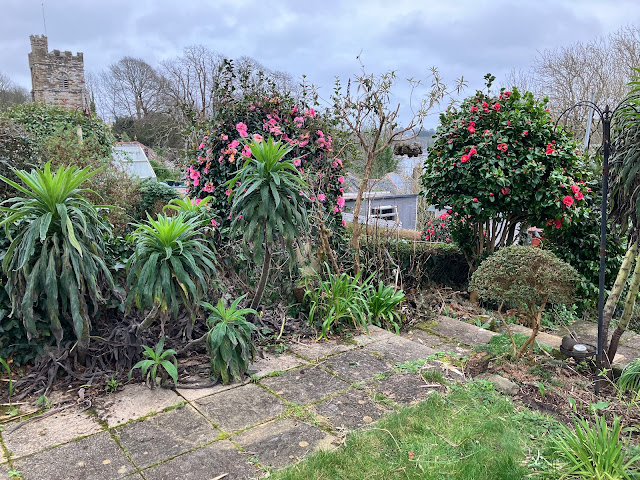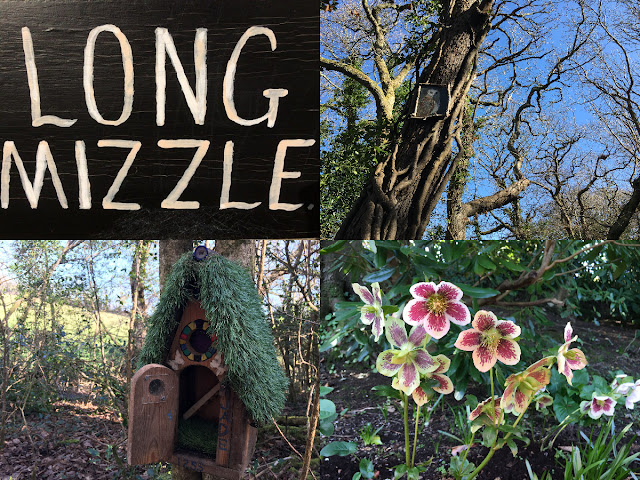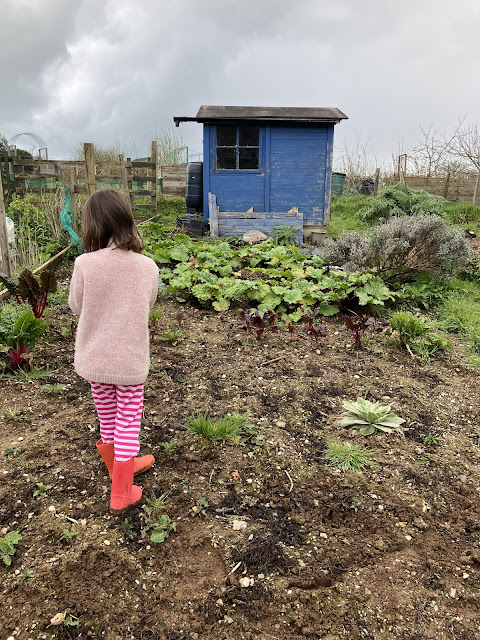Seaweed, cess pits and salty creatures
Hello m' perky porpoises,
What did the sea know of the land?
Through every crevice, every vein of man it had ran.
Stored in his bone marrow, out through his bowels,
down to the sewers and treatment plants.
Who was listening, when the core was changing?
Were the whales singing? L.B
It is around this time of year that I start to get excited about piles of seaweed. It has been a long Cornish tradition to barrel it up from the beach, following a favouring gale. Who knows what other useful items can be found for the garden: driftwood, unusual pebbles, shells, a random welly, netting, interesting rusty pots, fisherman floats if one is especially lucky.
The seaweed I collect from above the shore line and spread it flat across my garden beds. I used to rinse it in rainwater first, but now I just leave it to the winter weather. By spring, it has shriveled up to almost nothing, and can be satisfyingly crunched up in the hand. I am a believer in feeding the soil, and seaweed is rich in potash and trace elements for plant health.
As the winter nights draw in, I have been retiring to bed with a cuppa, plate of buttery scotch pancakes and book.
My good neighbour has a endless library of local history books, and he's lent me a pile 'for starters'. One book I have been especially enjoying is 'Laughs and Sweet Memories - A personal portrait of Gorran Haven - a small fishing village - between the wars' by Archie Smith.
Many of Cornwall's old fishing communities are sadly gone. St Ives is a prime example of the devastating effects of the decline of fishing coupled with unregulated tourism. Once bustling with salty sea dogs and families, it's now plagued by second home owners (from 'up country') running air bnbs. The properties sit vacant over winter, whilst the locals struggle to find somewhere real to live. Many say St Ives' heart was ripped out long ago.
The author, who grew up in Gorran Haven (near Mevagissey) as a lad in the twenties and thirties, wonderfully describes some ripe Gorran Haven fishermen. It is also interesting for me to hear of a time when most people had an allotment, or 'piece' to grow their own food. A few even cleared a bit of ground in the cliff for growing potatoes and cabbages. We are told that potatoes were risked from the end of February onwards.
'In fact, the little plot worked above Landlady (Vault Beach) by Teddy Patten's father, Andy, often produced the earliest potatoes because the proximity of the sea'.
The description of one allotment holder made me laugh -
'Jack (Hennah) was a character, a tough little customer, proud and not given to modesty, but an excellent fisherman and gardener...
His potatoes were always the best. They looked the best, they cropped the best, they were the best because Jack said so.
In latter years he had but one eye and nothing daunted him... He had a strong voice and if you got within spitting distance you would always be sprayed as he enjoyed talking and the words couldn't get out quickly enough.'
Seaweed was used in a big way, by both the allotment growers and local farmers. Following an east wind, the oarweed (seaweed) would be piled up above the normal high watermark, and promptly carted away via wheelbarrow or horse and cart.
But this was not the only useful soil conditioner claimed from the sea . Spider crabs, which were caught in large numbers, in trammels and pots, were unsaleable, so they were wheeled to the 'pieces' and dug in.
The above parts were collected and put together on a recent beach jaunt - I'm not sure if they belong to the same creature, or what type of crab it is. We left the meaty bits, but brought home the hollowed out shell. It is too pretty to dig into the garden though!
Another book in the homework pile , - 'Life in Cornwall in the early nineteenth century', goes even further back in time. Through looking at adverts from the West Briton Newspaper (1810-1835), we discover that a farm near the coast was considered a great advantage.
Disturbingly, a nearby town was also hailed an advantage for its special 'town -dung' -
'To be sold by auction... all that part of the said Penwarne, a good dwelling house, all convenient outhouses, an excellent orchard of an acre...82 acres of exceedingly rich meadow, pasture and arable land. The above premises are most admirably situated for manure, being within half a mile of Mevagissey where town-dung may be produced in any quantity, at the low price of a shilling per butt-load [a cart drawn by yoked oxen].'
I wonder if this is what some might call 'night soil', or ' a whole load of sh*t' ?
Back to nicer thoughts to dream of, last weekend we saw a pod of dolphins out in Falmouth Bay. This was very magical for the little ones. My brother has since suggested that they may have been blue fin tuna (they are giant, also jump- and are a rare sight). Well of course we didn't catch them on camera, but seeing as it has inspired lots of artwork, we are sticking with dolphins!!!
Hope you are well. Please say do hello and send me gossip.
I'm a bit behind on blog reading, but I intend to sort that out this weekend. The kettle is on.
Lulu xXx
[The uncredited poem in my last remembrance post is a result of my late night scribblings -
Ol' Glass Eyed Mumrah was worried I had stolen it / not properly credited it]



















this is a wonderful post - and interesting too!
ReplyDeletenow it's out - you are a poet disguised as a gardener!! wow!
love the photos of the beach - especially the giant surf in the background. almost hear the sound..... and you saw dolphins - for sure! lovely watery art!
i miss the sea. its much to long that i have visited - not even our tame baltic one.
very smart to use the seaweed or crabs to fertilize the soil in the gardens.
but i guess "town-dung" means the manure of the carriage horses held in towns/cities and i know that back in the days even in the middle of berlin milk cows were kept in the yards of the blocks - to have fresh milk in a time without a freezer/cool truck. and think of all the horse poo left on the streets......
:-D
(using human stuff for the veggies causes cholera and such)
the dead of the villages are a europe wide case - not only fisherman has no income anymore - traditional farming is long gone too in most areas. the places are now occupied by city workers who only come for sleep - all the rural life has disappeared: the pub, the baker and the butcher, the cramed shop for the needs of the farmers/gardeners/housewifes. the school. the festivals too. some of the new inhabitants sue the pastor for ringing the church bells or the last native for his crowing rooster. and the frogs in the village pond have to go too - who can sleep with all that roaring noise!
sad.
on a happier note: have to copy your pancake/books/bed plan for a dark evening - sound very cosy!
stay warm and dry! xxxxx
Thank you Beate x Those waves on the north coast (Poldhu Cove) were enormous. No surfers out that day. Yes, you are right, 'town dung' must be from the horse poop lined streets and town cow sheds. Night soil is frowned upon :0 I have heard of the frog pond and church bell complaints - ridiculous! The pancakes are working a treat :) Stay safe, Lulu xXx
DeleteDear Lulu
ReplyDeleteVery interesting. Really sad that all the character has gone, due to the second home owners and properties staying empty, with prices rocketing so that local people can't buy a home. We used to go to the seaside at Hunstanton (on the east coast) regularly when I was little , usually off season. I have some wonderful memories to treasure.
have a lovely week
Best wishes
Ellie
Thank you Ellie. I am by no means against tourism, but it would seems sensible for me for the government to regulate these second homes as air bnbs - i.e. only so many allowed per area / licenses that need to applied for. It is deeply upsetting for the locals. Seaside holiday memories should be treasured. Lulu xXx
DeleteLove to hear the old tales and how things once were in Cornwall - a wonderful post both words and photos. How great to hear that above Vault Beach there were once potatoes growing!
ReplyDeleteHave a happy week.
Thank you Mike :) I thought you'd know of the spot at Vault Beach, being in your neck of the woods. You have a great week too, Lulu xXx
DeleteI used to live in Slapton (years ago) and we had to live in a static caravan as we could not find any housing for love nor money. In the end we had to move 'oop norf' to find housing and work. I still regret that x
ReplyDeleteWhat a shame Kate. We read a great Michael Morpurgo book set in Slapton Sands. Lulu xXx
DeleteWhat a wonderful post, Lulu. Evocative poetry and gorgeous photos too. I love reading up on local history. The village I grew up in and to which I returned after a 15-year gap, has almost changed beyond recognition. It was still quite rural when I left in my late teens, and it's heartbreaking to see how every bit of green space is being built upon. No second-homers but people who prefer to live here for its easy access to the motorway!
ReplyDeleteAlthough I knew about seaweed being used as fertilizer, it boggles my mind - but probably makes sense - that those spider crabs were dug in as well.
Seeing that pod of dolphins - of course they were dolphins! - must have been quite magical. xxx
Thank you Ann, very kind of you :) Glad that you love a bit of local history too. Those poor little crabs :0 The calcium is apparently very good for the soil though. The 'dolphins' were incredible. Lulu xXx
DeleteHello my little sugar kelp superstar (impressed by my research on seaweed variety?) what a delightful post it hit my inner mermaid right on the head and woke her up - was a strangely lovely but slightly too graphic poem, although if I were a whale I don't think I would enjoy swimming around in all that sewerage to be fair... like you I delight in odd and strangely mesmerising finds like empty crab shells - I once found a fabulous sea urchin (on an exotic holiday in Kenya) and scampered back to my room with it, with visions of transforming it into a lamp on return home ... after three days the smell was overwhelming - the poor old sea urchin was still living in there and with no water was getting very dry and stinky - I had to return it to the sea ....
ReplyDeleteHello Betty, I quite like being called 'my little sugar kelp superstar' ;) And yes, I am very impressed with your research. That sea urchin sounds yukky!!! Glad he made it back to the sea. Lulu xXx
DeleteAh, I really enjoyed this post! My mum did a recent collection of Seedweed from her local beach for the garden. I said I must do the same next time I go over for my raised bed! I did collect some last year!
ReplyDeleteSt Ives is sad. Second home owners do make me cross when it stops local people from buying. We didn't even stop there when we were in Cornwall as it looked too crowded so we drove onto Zennor and had a lovely time walking on the cliffs.
I like your pancake idea!
Oooh yes Kezzie, do it! Your raised bed will thank you. The housing crisis is a bit out of control in these parts :0 Zennor is magical, glad you enjoyed it. Lulu xXx
DeleteHi Lulu, That was a fascinating read. You really have done your homework! I love the description of Jack the fisherman. It's wonderful when writers record their subjects' characteristics - these are the things that really bring history alive. Town dung has a certain ring to it! I really wish the Government would take this second home ownership thing in hand. The balance has tipped the wrong way. Part of the appeal of a holiday (for me anyway) is encountering local characters. By the way, did you catch The Wild Gardener on Friday night? If you didn't, I'm sure you would enjoy that. Your poems are divine; such well woven words. I've also been writing a great deal more recently. I used to write poetry as a teenager, only then I was kidding myself that I was amassing song material for my breakthrough band I was yet to form. xxx
ReplyDeleteOh yes, Jack sounds like a wonderful salty character. I agree, it is wonderful to meet locals. Years ago, I went on a cheesy girls holiday to Tunisia. Most stayed by the hotel pool, but by chance, we met a local cabbie who took us to lots of interesting places off the beaten track. We got on with him so well, at the end of the week he took us home to meet his family. His mum and sisters made such a fuss of us...I'll never forget their kindness. Thank you for the poetry comment too ...and yes... you've guessed... it all starts with song lyrics! Lulu xXx
DeleteP.S. How lucky to see the dophins/tuna. Loving the artwork. xxx
ReplyDelete:) x
DeleteOh very interesting darling
ReplyDeleteI am learning about new places
Thank you Sakuranko for visiting and saying hello. Super nice to cyber meet you :) Lulu xXx
DeleteI love those old books about Cornwall as it was. My mum's memories of when she was a little girl at Gwithian - her nearest beach - are so different to now, except that of course the beach itself hasn't changed much. Lovely post, Lulu! xx
ReplyDeleteThank you Sue :) I bet your mum's got some great stories of Gwithian. Wonder if they surfed down the dunes on tea trays back then? Lulu xXx
DeleteI would never occur to me use seaweed in gardening. Now I'm sorry I don't live by the sea anymore.
ReplyDeleteI'm sure you miss it Ivana. Seaweed is good for the soul. Lulu xXx
Delete